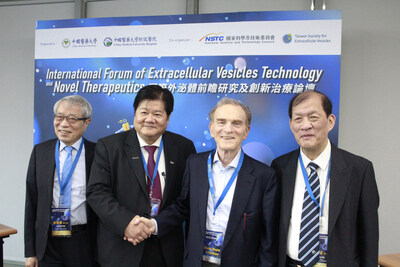TAICHUNG, Jan. 15,
2025 /PRNewswire/ -- On November 2, 2024, China Medical University (CMU)
and Healthcare System hosted the International Forum of
Extracellular Vesicles Technology and Novel Therapeutics to
highlight Taiwan's advancements
and explore new horizons in biomedical applications. Professor
Randy Schekman, the 2013 Nobel prize
laureate in Physiology/Medicine, was invited as keynote speaker
to share his insights in Extracellular Vesicles (EV) technology.
Notable scholars and industrial leaders, such as Professor
Andreas Möller, Professor Houjian
Cai, Professor Le Thi Nguyet Minh,
Professor Johannes Grillari, and
members of the International Society for Extracellular Vesicles,
the Asia Pacific Societies for Extracellular Vesicles, and the
Taiwan Society for Extracellular Vesicles attended the forum to
discuss the latest advancements in EV research, technology, and
applications.

Dr. Chang-Hai Tsai, Chairman of
CMU Healthcare System, stated that this forum marks a major
breakthrough in exosomal technology in precision medicine and
regenerative medicine. CMU Healthcare System aims to continue the
endeavor of promoting the international presence of Taiwan-based biotech industries, and to
deliver better personalized healthcare to the global community. EVs
are known to play a key role in aging, inflammation, disease
progression and inter-cellular communication. EVs or exosomes
technology will become a landmark in biological preparation
development and human health.
Professor Randy Schekman provided
an in-depth view of the key bridging role of exosomes in
inter-cellular communication, and the latest research on
quantitative science-based methods for increasing the "cargo
loading" efficiency of exosomes. In his keynote speech, Professor
Schekman highlighted the potential of exosome technology in
achieving therapeutic goals. The keynote was moderated by Dr.
Mien-Chie Hung, President of
CMU.
Dr. Long-Bin Jeng, CEO of CMU
Development Committee, stated that CMU Healthcare System acquired
notable results in exosome studies and development. Shine-On
BioMedical Co. introduced the application of HLA-G targeted exosome
in cancer treatment, and demonstrated innovative technology and
current development progress: using targeted exosomes loaded with
chemotherapy agent for effective inhibition of breast cancer cells
while reducing side effects. Shine-On BioMedical is also working on
Temodal, a chemotherapy agent indicated for brain cancer, to
develop a nucleic acid pharmaceutical agent aimed at reducing
resistance development. By carrying such agents through the blood
brain barrier using HLA-G targeted exosomes, outstanding efficacy
of difficult-to-treat brain tumors such as glioblastoma multiforme
(GBM) can be achieved. This will provide significant benefits to
cancer patients.
CMUH's Translational Medicine Research Center showcased
dual-gene-engineered exosomes for improving neurological recovery
after stroke. Partnering with Shine-Out BioTechnology Co., CMUH
developed targeted exosome platforms for treating neurodegenerative
diseases like Parkinson's and Alzheimer's. These platforms are
designed to boost cellular repair and regeneration. Additionally,
CMUH's Translational Cell Therapy Center advanced CD3ε
nanobody-modified exosomes, which may generate dual-targeting CAR-T
cells, highlighting the forum's commitment to clinical
innovation.
Dr. Der-Yang Cho, Superintendent of CMUH, emphasized the
potential of exosomal platforms in cancer and neurodegenerative
treatments, aiming to reduce dosages and side effects. Despite
challenges in scaling production, CMUH is dedicated to advancing
clinical research and fostering international collaborations to
bring cutting-edge medical technologies to patients.
CONTACT: Carolyn Chen,
100709@tool.caaumed.org.tw
 View original content to download
multimedia:https://www.prnewswire.com/news-releases/taiwan-cmu-healthcare-system-and-nobel-laureate-randy-schekman-drive-new-frontiers-in-exosome-technology-302351489.html
View original content to download
multimedia:https://www.prnewswire.com/news-releases/taiwan-cmu-healthcare-system-and-nobel-laureate-randy-schekman-drive-new-frontiers-in-exosome-technology-302351489.html
SOURCE China Medical University Hospital